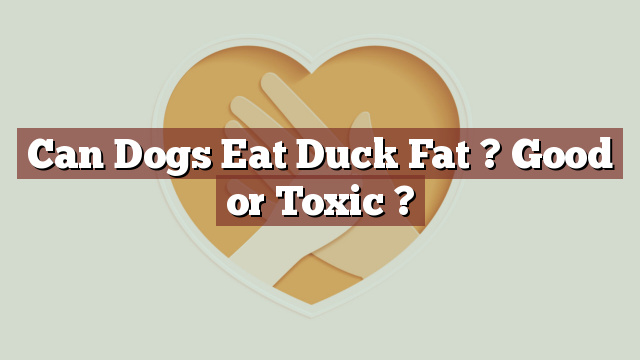Can Dogs Eat Duck Fat? Good or Toxic?
Knowing what foods are safe for our furry friends is essential to ensure their well-being and prevent any potential health risks. One food that often raises questions among dog owners is duck fat. In this article, we will explore whether dogs can consume duck fat, considering its nutritional value, safety, and potential risks or benefits.
Nutritional Value of Duck Fat: What Does it Offer to Dogs?
Duck fat is a rich source of fat, similar to other animal fats. It primarily consists of monounsaturated and polyunsaturated fats, which can provide dogs with a good source of energy. Additionally, duck fat contains vitamins A, D, E, and K, which are essential for various bodily functions.
Can Dogs Eat Duck Fat? Exploring Safety and Toxicity.
Can dogs eat duck fat? While small amounts of duck fat may not be immediately harmful to dogs, it is generally not recommended to include it as a regular part of their diet. The high fat content in duck fat can lead to weight gain and potentially contribute to obesity in dogs. Moreover, large amounts of fat can strain a dog’s digestive system and may cause pancreatitis, a serious condition that requires immediate veterinary attention.
Veterinary experts advise against feeding dogs excessive amounts of fat, including duck fat, as it may lead to gastrointestinal upset, such as diarrhea or vomiting. Additionally, certain dogs with underlying health conditions, such as pancreatitis or liver disease, should strictly avoid consuming duck fat.
Potential Risks or Benefits of Dogs Consuming Duck Fat.
While there are potential risks associated with dogs consuming duck fat, it is important to note that not all dogs will have the same reaction. Some dogs may tolerate small amounts of duck fat without any issues, while others may experience adverse effects. However, it is crucial to remember that a dog’s regular diet should primarily consist of balanced and appropriate dog food, formulated to meet their specific nutritional needs.
On the other hand, incorporating moderate amounts of healthy fats into a dog’s diet, such as omega-3 fatty acids from fish or flaxseed oil, can have various health benefits. These fats promote a healthy coat, support brain function, and contribute to overall well-being. Therefore, instead of duck fat, it is advisable to consider other healthier alternatives when supplementing a dog’s diet with additional fats.
My Dog Ate Duck Fat, What Should I Do?
If your dog has consumed a small amount of duck fat and shows no immediate signs of distress, closely monitor them for any gastrointestinal issues. However, if your dog has ingested a large amount of duck fat or exhibits symptoms such as vomiting, diarrhea, abdominal pain, or loss of appetite, it is crucial to seek immediate veterinary assistance. The veterinarian will be able to assess the situation and provide appropriate guidance or treatment.
In Conclusion: Understanding the Impact of Duck Fat on Dogs’ Health.
In conclusion, while small amounts of duck fat may not cause immediate harm to dogs, it is generally not recommended to include it as a regular part of their diet. The high fat content in duck fat can lead to weight gain, digestive issues, and potentially serious conditions such as pancreatitis. It is important to prioritize a balanced and appropriate dog food that meets their specific nutritional needs. If you have any concerns or questions about your dog’s diet or health, consulting with a veterinarian is always the best course of action.
Thank you for investing your time in exploring [page_title] on Can-Eat.org. Our goal is to provide readers like you with thorough and reliable information about various dietary topics. Each article, including [page_title], stems from diligent research and a passion for understanding the nuances of our food choices. We believe that knowledge is a vital step towards making informed and healthy decisions. However, while "[page_title]" sheds light on its specific topic, it's crucial to remember that everyone's body reacts differently to foods and dietary changes. What might be beneficial for one person could have different effects on another. Before you consider integrating suggestions or insights from "[page_title]" into your diet, it's always wise to consult with a nutritionist or healthcare professional. Their specialized knowledge ensures that you're making choices best suited to your individual health needs. As you navigate [page_title], be mindful of potential allergies, intolerances, or unique dietary requirements you may have. No singular article can capture the vast diversity of human health, and individualized guidance is invaluable. The content provided in [page_title] serves as a general guide. It is not, by any means, a substitute for personalized medical or nutritional advice. Your health should always be the top priority, and professional guidance is the best path forward. In your journey towards a balanced and nutritious lifestyle, we hope that [page_title] serves as a helpful stepping stone. Remember, informed decisions lead to healthier outcomes. Thank you for trusting Can-Eat.org. Continue exploring, learning, and prioritizing your health. Cheers to a well-informed and healthier future!

